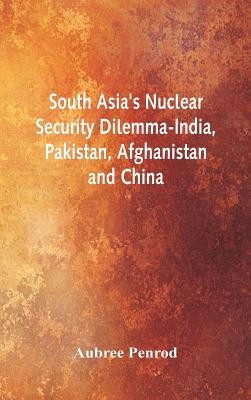
- We will send in 10–14 business days.
- Author: Aubree Penrod
- Publisher: Alpha Edition
- ISBN-10: 9352977343
- ISBN-13: 9789352977345
- Format: 15.2 x 22.9 x 1.9 cm, hardcover
- Language: English
- SAVE -10% with code: EXTRA
South Asia's Nuclear Security Dilemma- India, Pakistan, Afghanistan and China (e-book) (used book) | bookbook.eu
Reviews
Description
Nuclear proliferation in South Asia is in part a consequence of the security dilemma existing in the subcontinent. Security dilemmas arise when a state's mechanisms for increasing its security negatively impact the security and threat perceptions of other states. In recent years, experts have closely studied two main aspects of regarding South Asian nuclear issues. First, nuclear modernization in the region continues with the development of longer-range and more reliable delivery systems, as well as qualitative and quantitative increases in fissile material and warheads. Initiatives, such as the Indo-U.S. nuclear deal, have brought renewed focus on this issue due to its potential impact on proliferation in South Asia. Second, the A.Q. Khan network confirmed the entry of non-state actors into the realm of nuclear proliferation. Lingering questions regarding the network's activities suggest that its impact has not yet been fully assessed. The nuclear weapons and ballistic missile tests conducted by India and Pakistan in the late 1990s substantially altered the security environment, both in the region and globally. Pakistan's nuclear arsenal has always been justified as a deterrent against Indian aggression, and there is no indication that Pakistan's military leadership is inclined to place voluntary limits on the growth of its nuclear program. India, as a rising power, is expanding its military to compete not only with Islamabad but also with Beijing, and this triangular security dilemma between China, India, and Pakistan favors persistent competition, most of all by the weakest player. This book outlines the basic strategic structure of the Indo-Pakistani rivalry, india china nuclear rase, the dynamic factors driving the rivalry, and finally various possible solutions. The relationship between nuclear weaponization and the broader indices of economic modernization are analyzed.
EXTRA 10 % discount with code: EXTRA
The promotion ends in 17d.04:32:58
The discount code is valid when purchasing from 10 €. Discounts do not stack.
- Author: Aubree Penrod
- Publisher: Alpha Edition
- ISBN-10: 9352977343
- ISBN-13: 9789352977345
- Format: 15.2 x 22.9 x 1.9 cm, hardcover
- Language: English English
Nuclear proliferation in South Asia is in part a consequence of the security dilemma existing in the subcontinent. Security dilemmas arise when a state's mechanisms for increasing its security negatively impact the security and threat perceptions of other states. In recent years, experts have closely studied two main aspects of regarding South Asian nuclear issues. First, nuclear modernization in the region continues with the development of longer-range and more reliable delivery systems, as well as qualitative and quantitative increases in fissile material and warheads. Initiatives, such as the Indo-U.S. nuclear deal, have brought renewed focus on this issue due to its potential impact on proliferation in South Asia. Second, the A.Q. Khan network confirmed the entry of non-state actors into the realm of nuclear proliferation. Lingering questions regarding the network's activities suggest that its impact has not yet been fully assessed. The nuclear weapons and ballistic missile tests conducted by India and Pakistan in the late 1990s substantially altered the security environment, both in the region and globally. Pakistan's nuclear arsenal has always been justified as a deterrent against Indian aggression, and there is no indication that Pakistan's military leadership is inclined to place voluntary limits on the growth of its nuclear program. India, as a rising power, is expanding its military to compete not only with Islamabad but also with Beijing, and this triangular security dilemma between China, India, and Pakistan favors persistent competition, most of all by the weakest player. This book outlines the basic strategic structure of the Indo-Pakistani rivalry, india china nuclear rase, the dynamic factors driving the rivalry, and finally various possible solutions. The relationship between nuclear weaponization and the broader indices of economic modernization are analyzed.


Reviews